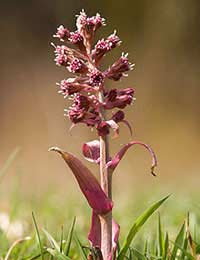Butterburr: Pros and Cons

Butterburr, or butterbur, is the common name of an extract from the plant Petasites hybridus. It has been tested in a full clinical trial, which concluded it did have some positive impact on the frequency of migraine headaches in people who suffer several attacks each month. Since 2004, when the study was published, very little other research has been carried out, so it is difficult for people with migraine to find out if it is worth taking or not.
The Evidence for Butterbur
Many effective drugs come from plant extracts and anecdotal evidence that the butterbur plant was useful as a preventative treatment for migraine suggested it might be worth investigating. A team of US researchers set up a clinical trial in the early 2000s, using standardised extracts of butterbur to compare its effects at different doses. A group of people with frequent migraines were split into three subgroups and given either a placebo or a 50mg or 75 mg dose of butterbur.The results showed that the higher dose of butterbur was significantly more effective than placebo at preventing migraines. After three months, migraine frequency in the group treated with the 75mg dose had reduced by 48% - which means that these people were having only half as many headaches as before they started the trial.
Obtaining Butterbur – Caution is Needed
The clinical trial was careful to note that only extracts of butterbur that had been produced under the best conditions were suitable. Plant extracts used as complimentary medicines are sold as food supplements in the UK, and the amount of active plant extract must be controlled accurately. This makes sure that each batch of tablets contains the same ingredients.If you decide to take butterbur for migraine prevention it is important to obtain the tablets from a reputable supplier. They can be bought over the internet, but an established supplier is best. It is possible to get hold of the plant itself, but it is not a good idea to try to make the extract, as this will result in a preparation with an unknown amount of the active ingredient. There is also the worry that a crude extract will be contaminated with other plant ingredients – some of which are known to be cancer causing.
Long Term Safety of Butterbur
The researchers that ran the trial of butterbur also noted that tablets that provide a daily dose of 100mg of butterbur extract have been sold in Germany since 1992, and around half a million people have taken the extract since it was first allowed onto the market. Although herbal preparations are just as liable to have side effects as drugs produced by the pharmaceutical industry, butterbur seems very well tolerated and safe. Most of the adverse effects are on the digestive system.Butterbur – or Butterburp?
The most likely side effect of butterbur is that it increases gas production in the digestive system – many people who have taken it report that it makes them burp. This can be inconvenient but most of the people who have found that it helps reduce the frequency of their severe migraines view it as a small price to pay.- Deep Brain Stimulation and Cluster Headaches
- Quiz to Assess Head Pain: Headache or Migraine?
- Putting Together a Headache Treatment Kit
- Keeping Track of Headache Triggers
- Creating a Headache Care Sheet for Your Child's School
- Monitoring Headache Therapy Over Time
- Assessing the Severity of Your Head Pain
- Migraine Disability Assessment Questionnaire
- Headache and Migraine Impact Quiz
- Child Friendly Headache Questionnaire
- Keeping a Migraine Diary


Re: Migraines and Menopause
I have at 51yrs, only recently found out (thro' blood test) I am going thro' the menopause And just recently started with bad migraines…
Re: Headache With Pins and Needles: Is This Serious?
I’ve had a headache for the past 3 days however I am on my period so didn’t think anything of it however…
Re: Migraines and Menopause
I suffered horrid migraines in my teenage years, which re-appeared when I was 40.... now 54 and having developed all symptoms of…
Re: Flicker Illness
This is first time I have researched a condition that I have developed in only the last four years, and as of this date am fifty four years old. I…
Re: Migraines and Menopause
I started with headaches from about March this year all down in the back of my neck and across the front of my head. I’ve had one period…
Re: Migraines and Menopause
Hello I am going through early menopause I’m only 38 and have been feeling unwell for six months doctor has put me on HRT but I have been…
Re: The Cost of Headaches in the UK
I have had constant headaches for about 4 weeks. I have been to the opticians but everything is fine. My GP is not concerned…
Re: Migraines and Menopause
I've been suffering with headaches for 8 months now. My last period was march this year. The headaches are as follows tightness around…
Re: Migraines and Menopause
Im really grateful to have found this page. A few months back I had a thunderclap headache and was rushed to ED for all the usual tests.…
Re: Scalp Pain: What Causes It?
I cannot consume any additives, preservatives or dyes. Today I ate about a tsp of the potato salad I made for a picnic. It had…